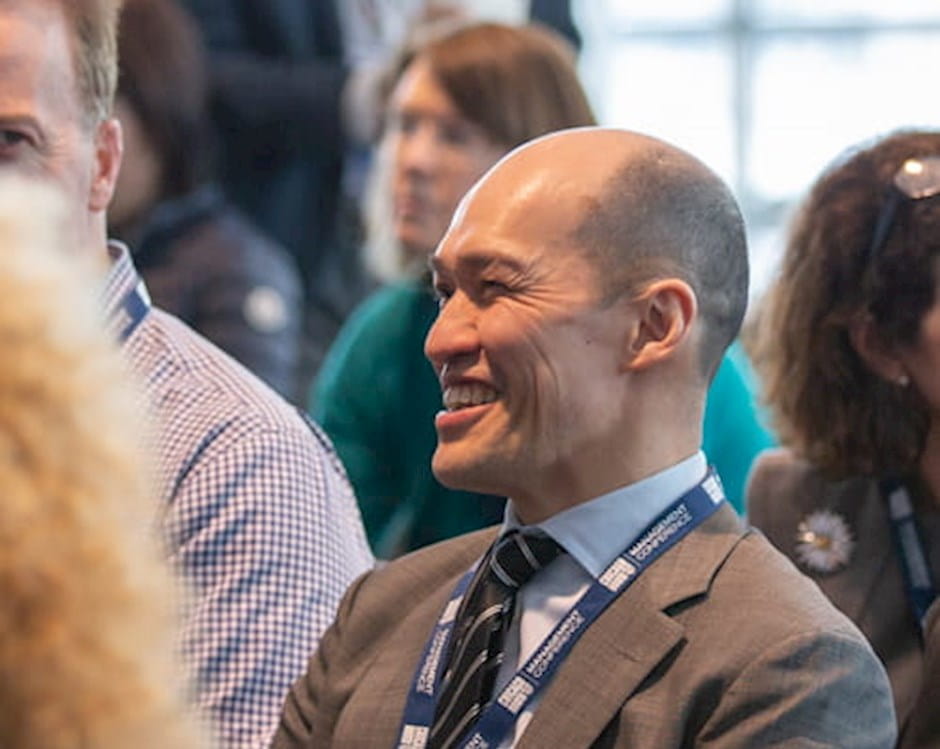
At Management Conference, Booth alumni gathered in Chicago for a day of intellectual engagement and high-impact insights, from how to be a better entrepreneur to what’s next in the world of investment banking,
- By
- May 20, 2019
- Leadership

What are today’s investors looking for? Why is it necessary to pick the right partners when starting a business? Will automation fundamentally change the labor market?
These were just a few of the many questions that were answered at this year’s Management Conference. More than 950 Booth alumni, students, faculty, and members of the business community attended this year’s conference.
Here are a few of the takeaways from this year’s breakout sessions.
During a panel discussion on entrepreneurship, Jason C. Brown, ’09, cofounder and CEO of Tally Technologies, a leading financial automation company, said he thinks most business partnerships in the startup world fail because of too much overlap in job responsibilities, or when egos are above the objective of the business. Brown met business partner and fellow Booth graduate Jasper Platz, ’09, and the two started their first business, Gen110, which was acquired by Solar Universe in 2013.
“I think the most important thing to a successful business partnership is having two grounded people,” Brown said. “Jasper and I have the ability to talk through everything. We often disagree, but we never leave a meeting in disagreement. We never lose sight that the objective is to build a successful company.”
“When you think about wealth creation for the Main Street investor, it's about being able to access a growing company at the $1 billion level,” said John Roger Ettelson, ’84, president and CEO of William Blair & Company, who also spoke on the investment banking panel. “There’s a lot of wealth creation out there for Main Street America; think about Amazon going from a $1 billion company to more than $900 billion. A lot of investors were able to ride that out. But when a company stays private longer and then goes public, there is less upside left.”
Wanted: Someone who can handle the fishbowl of shareholder and stakeholder scrutiny. Who knows the deep value of reputation. Who eschews CEO entitlement for CEO enlightenment, putting purpose and people first.
Those were just some of the topics tackled by three executives, who took part in a CEO perspectives alumni panel. During the discussion, Kevin Connelly, ’79, CEO of Spencer Stuart, said there’s a significant shortage of talented executives. “The competition to attract and retain people who are difference-makers has never, ever been greater,” Connelly said.
There’s a common saying in the business world: “Culture eats strategy for lunch.” Clinical professor of entrepreneurship and strategic management James E. Schrager wanted to challenge that assumption in his presentation.
Professor Schrager listed signs of a good, healthy culture as everything from happiness at work to employees willing to go the extra mile—and these things are harder to come by at businesses that are struggling. Generally speaking, Professor Schrager said, the catalysts for a good culture are growth and profits—or a belief that those profits are on the horizon.
Professionally-funded startups, for example, typically have an excellent culture even if they aren’t yet making profits, because the employees feel invested in the startup and believe success is just around the corner. “A great culture comes from actually doing well or believing it will do well,” he said.
How frightened should we be of automation in the labor market? That’s the question Michael Gibbs, clinical professor of economics, sought to answer in his presentation at Management Conference, Labor Market Robot Apocalypse?
Most high-skill jobs requiring strategic decision-making and creativity and low-skill jobs requiring human connection and empathy are less exposed to significant changes due to automation. The biggest threat to automation in the labor market, according to Professor Gibbs, is to middle-skill jobs. That, along with the labor market’s increasing value for high-skilled workers, is a major cause of inequality worldwide.
“A lot of the political issues that we are seeing are driven by this increasing inequality, largely driven by technological change,” Professor Gibbs said. “It is all over the world—every economy in every continent, except Antarctica.”
During his presentation, Professor Gibbs cited the work of fellow Booth professor Raghuram G. Rajan, Katherine Dusak Miller Distinguished Service Professor of Finance and author of The Third Pillar, saying that he has been talking about these concerns for many years. Professor Gibbs said that these labor market dynamics will get worse before they get better, especially if public-policy problems, such as the quality of our educational systems and our social safety net, aren’t addressed.
But Professor Gibbs does anticipate that there will eventually be a rebound of jobs effected by automation, provided policymakers institute the correct public-policy measures to lead to this rebound. The next generation will have a higher emphasis on STEM and social skills, he said, and it’s up to us to make sure kids are adaptable and creative.